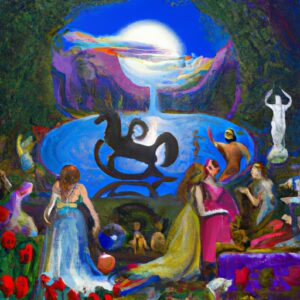If you’re planning a trip abroad, you should always know how to ask for food and drink in the local language. So, today’s post will be about how to say water in Italian.
Water is probably the most important thing in the world. Because of this, it also has many cultural meanings that vary from place to place.
So, today you’re not only going to learn how to translate “water” to Italian, but you’re also going to see a series of proverbs and expressions that might come in handy in everyday life in Italy.
Italian Word for Water
The Italian word for water is acqua. It is pronounced “ak-kwah” (more or less) and derives from the Latin word aqua.
As you may have guessed, it is a feminine word, and its plural form is acque.
Now, since we mentioned asking for food and drink, the first sentence you should learn is:
Posso avere un bicchiere d’acqua, per favore?
Can I have a glass of water, please?
Another phrase you might find useful if you’re going to Italy this winter is:
La doccia non manda acqua calda.
The shower has no hot water.
I hope you never have to use it, but just in case… at least you’ll know what to tell the handyman.
And finally, although you’ll use it very rarely, here’s another standard sentence it’s good to know.
Andiamo, mi si sono rotte le acque.
Hurry up, my water broke.
Italian Proverbs about Water
Water is not only a very important element. It is also full of spiritual and philosophical meanings. Its flow is often associated with time, and its ever-changing nature makes people associate it with a lot of different concepts.
Water can be clear, fresh, calm, and life-saving, but also wrathful and devastating. So, it’s really no surprise that it is featured in many proverbs and metaphors. Let’s see some of them.
My favorite one is from Central Italy. It says:
Chi nega l’acqua, gli si secca il pozzo.
He who denies water to a stranger will end up with a dry well.
It tells a lot about how hospitality used to be important for older generations. Another nice proverb is:
Acqua cheta rompe i ponti.
Calm water can break bridges.
It means that with constant and patient work, you can achieve everything. It can also be used to refer to those people that are usually shy or silent, who can make a great difference when they finally open their mouths.
The importance of water’s constant flow can be found in another nice Italian proverb that says:
Acqua che corre non porta veleno.
The water that flows is not poisonous.
Stagnant water is not good to drink. This proverb expresses the importance of changing in life. And speaking about letting water go, here’s a funny one:
Bevi il vino e lascia andare l’acqua al mulino.
Drink wine and let the water go to the mill.
I think there’s no need to explain that.
There are many other proverbs to learn, but most of them are in dialect and would lose part of their beauty if they were translated to Italian.
On the other hand, there are some idiomatic expressions related to water that you can use in everyday conversations.
Let’s see some of them.
Idiomatic Expressions with acqua and Their Meanings
Below you’ll learn some of the most common Italian expressions related to water. They are all very evocative.
For instance, there’s:
Perdersi in un bicchiere d’acqua.
To get lost in a glass of water.
This is the Italian equivalent of “to make a mountain out of a molehill“. It means: “to worry or to make a big deal of something that is actually a small problem, or not a problem at all“.
Then there’s:
Acqua e sapone.
Water and soap.
This expression is used to describe those women who have a simple, natural beauty – that kind of beauty that doesn’t require make-up to stand out.
In these two examples, water was used to describe something simple and clear. But there are cases in which water can be terrible.
For instance, when you’re in dire straits, you can say:
Sto con l’acqua alla gola.
I’m with water up to the throat.
It kinda explains itself, doesn’t it? It can also be used to say that you’re on a very strict deadline.
Similarly, a person can also:
Essere/nuotare in cattive acque.
To be/to swim in bad waters
As for the precedent expression, the act of swimming can be used as a metaphor for going through life. But unlike “stare con l’acqua alla gola“, this expression doesn’t evocate a feeling of urgency and is mostly used to describe a generally bad situation.
However, being surrounded by water doesn’t always have to be associated with drowning. For instance, if you’re a fish, water is your only house.
And if you find yourself in a situation to which you don’t belong, you might feel:
Come un pesce fuor d’acqua.
Like a fish out of water.
These are only a few of the most common expressions related to water. There are many others that you may hear in everyday conversations, like:
- acqua sotto i ponti (lit. “water under the bridge“), an expression that describes the passing of time;
- fare acqua da tutte le parti (lit. “to drip water everywhere“) = to have some serious flaws;
- fare un buco nell’acqua (lit. “to make a hole in the water“) = to fail at doing something;
- Scoprire l’acqua calda (lit. “to discover hot water“) = to state something obvious. It is usually said sarcastically.
- Tirare l’acqua al proprio mulino (lit. “to pull water to your own mill“) = to do something for your own gain.
Do you see what I meant when I wrote that water could be associated with both positive and negative meanings?
Don’t be like a fish out of water
Now you know how to ask for water in Italian and some standard phrases that might come in handy during a trip to Italy.
You’ve also learned many proverbs and idioms, which is a great way to become more fluent in a language.
Learning popular wisdom is one of the things I love about studying languages.
It makes me feel more connected with the people that speak them, which is the same reason why I like learning the origins of words.
Keep checking this blog to learn more Italian words and cultural curiosities. Ciao!
Try out the Italian Course “Ripeti Con Me”.










One Response
Thanks for sharing this! I’ve always been curious about how to say water in different languages. Can’t wait to learn some Italian phrases!